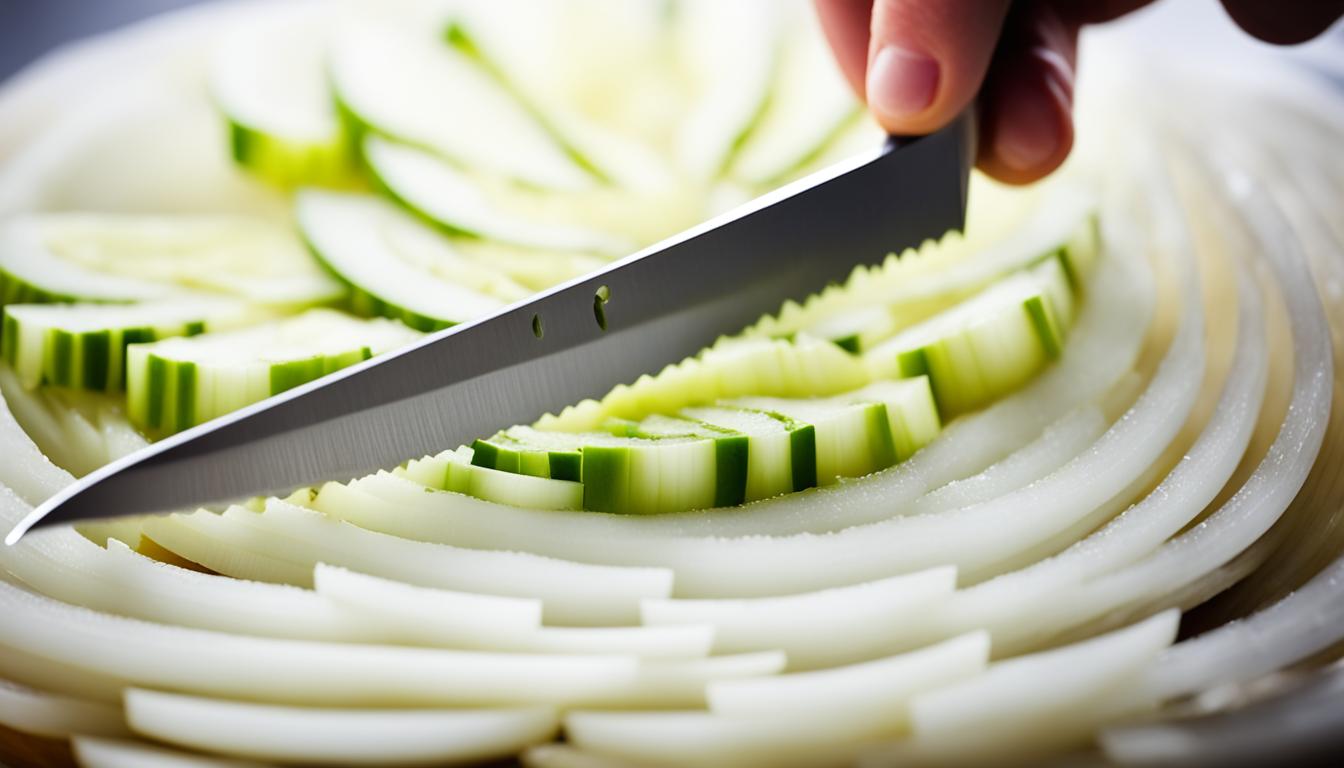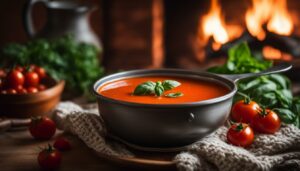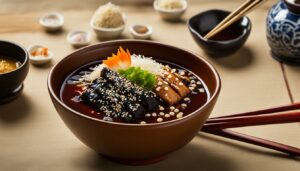Have you ever wondered why almost every recipe you come across includes onions in its ingredient list? Whether it’s a hearty soup, a flavorful stir-fry, or a mouthwatering pasta sauce, onions seem to be a constant presence in the culinary world. But why is that? What is it about onions that make them an essential component of countless dishes?
Contents
- 1 The Flavorful Allium Family
- 2 The Importance of Onions in Cooking
- 3 Health Benefits of Using Onions in Cooking
- 4 Onion Varieties and Usage
- 5 Tips for Using Onions in Cooking
- 6 The Importance of Onions in Different Cuisines
- 7 The Art of Onion Pairing
- 8 Conclusion
- 9 FAQ
- 9.1 Why are onions included in almost every recipe?
- 9.2 What other members of the Allium family can be substituted for onions in recipes?
- 9.3 Which onion varieties are commonly used in different recipes?
- 9.4 What are some popular dishes that include onions?
- 9.5 What health benefits do onions offer when included in cooking?
- 9.6 How can I maximize the nutritional benefits of onions when cooking?
- 9.7 What are some cooking tips for using onions?
- 9.8 How do onions enhance different cuisines?
- 9.9 What can be used as an onion substitute in cooking?
- 9.10 Why should I include onions in my recipes?
- 10 Source Links
Key Takeaways:
- Onions add flavor and depth to recipes from various cuisines around the world.
- They belong to the Allium family and have a distinctive flavor thanks to volatile compounds.
- Onions are commonly used as a base for flavor in soups, stews, and sauces.
- They offer numerous health benefits and are rich in antioxidants.
- Different onion varieties have unique flavor profiles and can be used in a wide range of recipes.
The Flavorful Allium Family
Onions belong to the Allium family, which also includes garlic, chives, shallots, and leeks. Their distinctive flavor comes from volatile compounds that are released when the bulb is cut or exposed to heat. These compounds give onions their pungent and sulfurous taste.
While onions can be substituted in recipes with other members of the Allium family, their unique flavor can be difficult to replicate. There are various onion varieties available, each with its own flavor profile and characteristics.
“Onions are like the foundation of a good meal. They provide that depth and complexity that can take a dish to the next level of deliciousness.” – Chef Julia Grant
Onion Varieties
Here are some common onion varieties and their culinary uses:
| Onion Variety | Flavor Profile | Usage |
|---|---|---|
| Yellow Onions | Strong and pungent | Perfect for savory dishes and caramelizing |
| White Onions | Milder and slightly sweet | Commonly used in Mexican cuisine and raw dishes |
| Red Onions | Mild and slightly sweet | Ideal for salads and raw preparations |
| Shallots | Garlicky and delicate | Great for sauces, dressings, and pan-roasting |
Understanding the different onion varieties can help you enhance the flavors of your recipes and experiment with unique combinations.
When it comes to creating delicious meals, onions are an essential ingredient that brings depth and character to a variety of dishes. In the next section, we’ll explore the importance of onions in cooking and uncover some popular dishes where onions play a starring role.
The Importance of Onions in Cooking
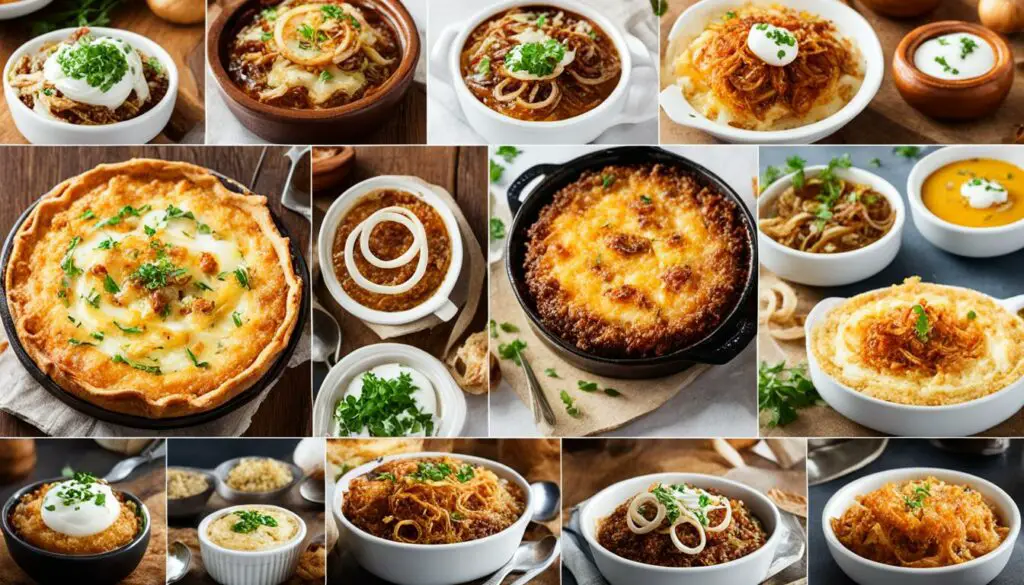
Onions play a crucial role in the world of cooking, being a staple ingredient in many popular dishes. Their distinct flavor and aroma add depth and complexity to recipes, making them a favorite among chefs and home cooks alike.
One of the main reasons onions are highly valued in cooking is their ability to act as a flavor base. They provide a savory and aromatic foundation for soups, stews, and sauces, enhancing the overall taste of the dish. The natural sweetness of onions adds a balanced richness, complementing other ingredients and bringing out their flavors.
But the magic doesn’t stop there. Onions can also be transformed through various cooking techniques to elevate their flavor profile. Caramelizing onions brings out their natural sweetness and imparts a rich, deep flavor that adds complexity to dishes like French onion soup or caramelized onion tart. Roasting onions creates a soft, mellow texture and sweetens their taste, perfect for adding to roasts or vegetable medleys. Pickling onions adds a tangy and crisp element, ideal for garnishing salads or serving alongside cheese platters.
Onions’ versatility shines through in their ability to be incorporated into a wide range of cuisines and recipes. From Asian stir-fries to Italian pasta sauces, onions are an integral part of countless culinary traditions. They can be sautéed, fried, grilled, or raw, lending their unique flavor to dishes from all corners of the globe.
The Onion’s Role in Popular Dishes
Let’s take a look at some of the popular dishes that simply wouldn’t be the same without the addition of onions:
- Classic Beef Stew: Onions, along with carrots and celery, form the holy trinity of flavor in a comforting bowl of beef stew.
- Fried Rice: Caramelized onions add depth and sweetness to this beloved Asian dish, balancing the flavors of soy sauce, vegetables, and protein.
- Salsa: An essential component of Mexican cuisine, onions provide a refreshing crunch and a touch of sharpness to salsas and pico de gallo.
- Bolognese Sauce: Onions, along with garlic and carrots, form the flavor base of this rich and hearty Italian meat sauce.
These are just a few examples of how onions contribute to the deliciousness of various dishes. Their unique flavor and versatility make them an indispensable ingredient in kitchens around the world. So, the next time you’re cooking up a storm, be sure to reach for this humble vegetable and unlock a world of flavors.
Health Benefits of Using Onions in Cooking
Onions offer numerous health benefits when included in cooking. They are a good source of antioxidants and contain compounds that have been linked to a reduced risk of certain cancers, heart disease, and inflammation. Onions also have antimicrobial properties and may help boost the immune system. To maximize the nutritional benefits of onions, it is recommended to consume them raw or lightly cooked.
- Antioxidant-rich: Onions are packed with antioxidants, such as quercetin, which can help fight against free radicals in the body and reduce oxidative stress.
- Reduced cancer risk: Some studies have suggested that onions may have anticancer effects, particularly in relation to colorectal and stomach cancers.
- Heart-healthy: Onions contain compounds that can help reduce cholesterol levels and blood pressure, promoting heart health and reducing the risk of cardiovascular diseases.
- Anti-inflammatory properties: The sulfur compounds found in onions have anti-inflammatory effects, potentially reducing inflammation in the body.
- Immune-boosting: Onions contain phytochemicals that may enhance the immune system and help the body fight against infections and diseases.
To fully enjoy the health benefits of onions, it’s important to handle and cook them properly. Here are some cooking tips for using onions:
- Consume raw or lightly cooked: To preserve the nutrients in onions, it’s best to eat them raw or lightly cook them. Overcooking or high-heat cooking methods may degrade their nutritional content.
- Avoid prolonged cooking: Onions are more beneficial when cooked for shorter periods of time. Excessive cooking can reduce their antioxidant properties.
- Store properly: To maintain the freshness and quality of onions, store them in a cool, dry, and well-ventilated place.
- Use fresh onions: While dried and powdered onions can be convenient, fresh onions generally retain higher levels of nutrients.
By incorporating onions into your cooking, you can not only enhance the flavors of your dishes but also reap the health benefits they offer. Whether you sauté them as a base for a delicious sauce or add them raw to a refreshing salad, onions are a versatile and nutritious addition to your culinary repertoire.
Onion Varieties and Usage
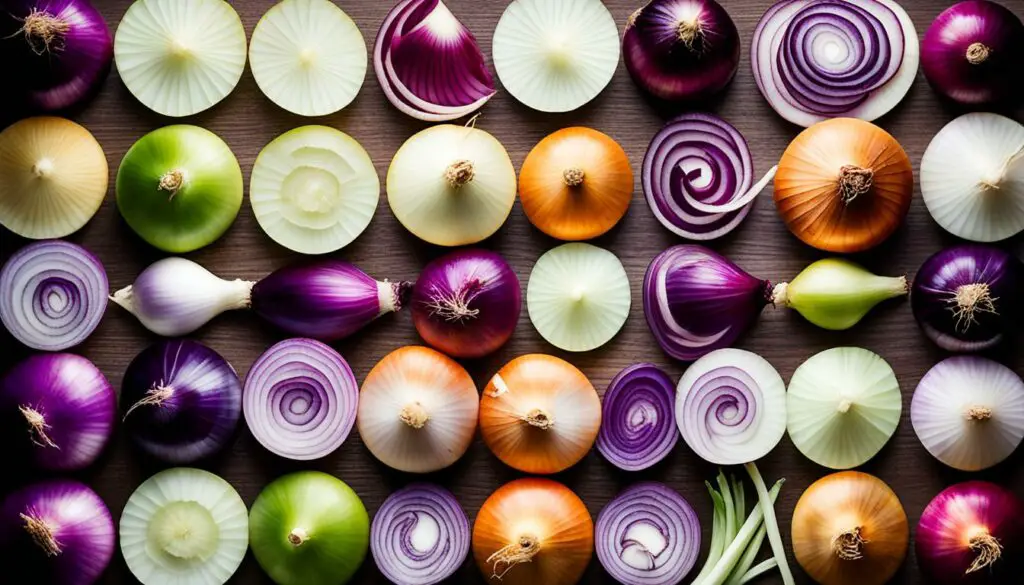
When it comes to cooking with onions, there is a wide range of varieties to choose from, each offering its own unique flavor and usage. Understanding the different types of onions can help elevate the flavors of various cuisines. Let’s explore some of the most popular onion varieties and how they can enhance your culinary creations.
Yellow Onions
Yellow onions are the most commonly used variety in cooking. Known for their strong and pungent flavor, they add depth and richness to a wide array of dishes. These onions are perfect for sautéing, caramelizing, or using as a base ingredient in soups, stews, and sauces.
White Onions
White onions have a milder flavor compared to yellow onions, making them a popular choice in Mexican cuisine. They are commonly used in salsas, guacamole, and other raw dishes where a more subtle onion flavor is desired.
Red Onions
Red onions are mild and slightly sweet, adding vibrant color and flavor to salads and other raw preparations. Their crisp texture and mellow taste make them a delightful addition to sandwiches, burgers, and even grilled dishes.
Shallots
Shallots are smaller onions with a distinct garlicky flavor. They are versatile and commonly used in sauces, dressings, and vinaigrettes. Their subtle yet complex taste makes them perfect for adding depth to your culinary creations.
Now that we’ve explored the different types of onions, it’s time to unleash your creativity in the kitchen and experiment with these flavorful varieties. Whether you’re aiming for a robust and hearty dish with yellow onions or a delicate and aromatic sauce with shallots, onions are a versatile ingredient that can elevate the taste of any cuisine.
| Onion Variety | Flavor | Usage |
|---|---|---|
| Yellow Onions | Strong and pungent | Sautéing, caramelizing, soups, stews, sauces |
| White Onions | Mild | Mexican cuisine, salsas, raw dishes |
| Red Onions | Mild and sweet | Salads, raw dishes, grilled dishes |
| Shallots | Garlicky | Sauces, dressings, vinaigrettes |
Tips for Using Onions in Cooking
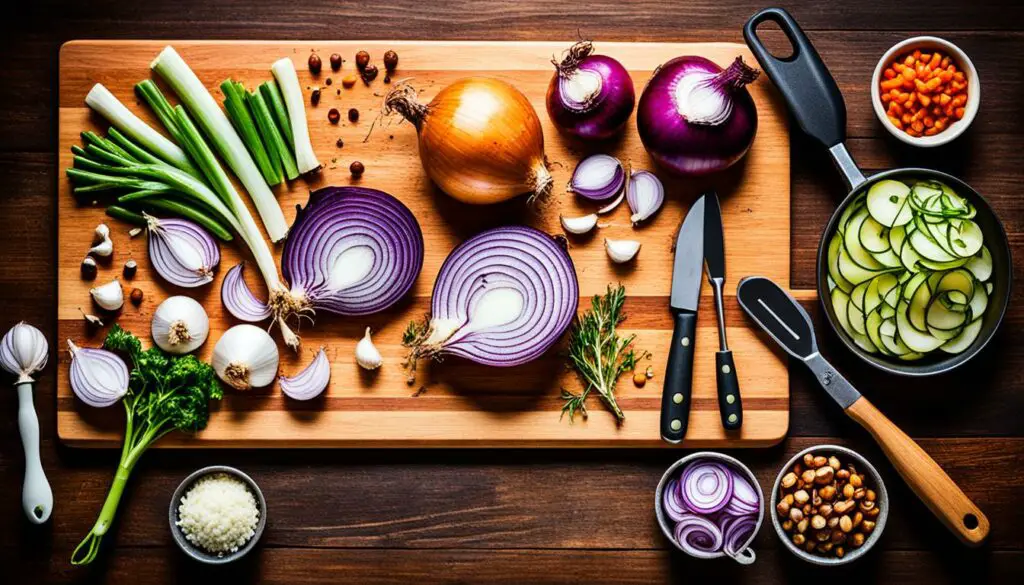
When it comes to cooking with onions, a few simple tips can make a big difference in flavor and texture. Whether you’re a seasoned chef or just starting out in the kitchen, keep these cooking tips in mind to make the most of this versatile ingredient.
- Soak sliced onions in cold water for 10-15 minutes before using to reduce their strong flavor and pungency. This can be particularly helpful when using onions raw in salads or other dishes.
- To caramelize onions for a sweeter and more intense flavor, cook them slowly over low heat. This process can take up to 45 minutes or more, but the result is worth the patience and effort. The onions should turn golden brown and develop a deliciously sweet taste.
- When sautéing onions, cook them until they are translucent. This will give them a milder flavor and a softer texture, perfect for incorporating into sauces, stir-fries, or as a topping for burgers and sandwiches.
- Properly chopping onions is essential for even cooking and flavor distribution in your recipes. Start by cutting off the stem and root ends, then peel off the outer skin. Cut the onion in half vertically, and finally make horizontal cuts without slicing all the way through. Finish by making vertical cuts to achieve your desired onion size.
By following these simple cooking tips, you can enhance the flavors and textures of your dishes when using onions. Whether you’re looking to add a subtle hint of onion flavor or a bold and caramelized taste, these techniques will help you achieve the desired results.
Remember, onions are not only delicious but also packed with health benefits. So, get creative in the kitchen and explore the endless possibilities of cooking with onions!
The Importance of Onions in Different Cuisines
Onions play a vital role in various cuisines around the world. They are used as a key ingredient in Indian curries, French onion soup, Italian pasta sauces, Mexican salsas, and many other dishes. Onions provide depth, flavor, and balance to these cuisines, creating unique and delicious flavors. Understanding the importance of onions in different cuisines can help you appreciate their versatility in cooking.
Whether it’s the aromatic base of a curry, the caramelized sweetness in a French onion soup, or the crunchy bite in a fresh salsa, onions bring their distinct flavor and aroma to every dish they are a part of. They have the ability to transform ordinary ingredients into extraordinary meals, enhancing the overall taste and dining experience.
In Indian cuisine, onions are often sautéed with spices to create a flavorful base for dishes like butter chicken, biryani, and masala dosa. In French cuisine, onions are slowly cooked until caramelized, resulting in a rich and sweet flavor that adds depth to soups, stews, and sauces. In Italian cuisine, onions are a fundamental ingredient in pasta sauces like Bolognese and arrabbiata, adding a savory note to the dish. Mexican cuisine utilizes onions in salsas, guacamoles, and tacos, providing a fresh and zesty flavor.
Onions not only contribute to the taste of a dish but also provide a balance of flavors. Their natural umami and sweetness can help counteract the acidity in tomato-based sauces or the spiciness in certain dishes. They act as a supporting character, enhancing the overall flavor profile without overpowering the other ingredients.
Furthermore, onions are incredibly versatile and can be prepared in various ways to suit different cuisines. They can be diced, sliced, or chopped, depending on the desired texture and presentation. From raw to caramelized, pickled to roasted, onions offer a range of flavors that can be creatively incorporated into diverse recipes.
So, the next time you’re exploring new recipes or cooking up your favorite dish, don’t forget the humble and indispensable onion. Its presence in different cuisines is a testament to its culinary significance and the role it plays in elevating the taste and complexity of meals.
The Art of Onion Pairing
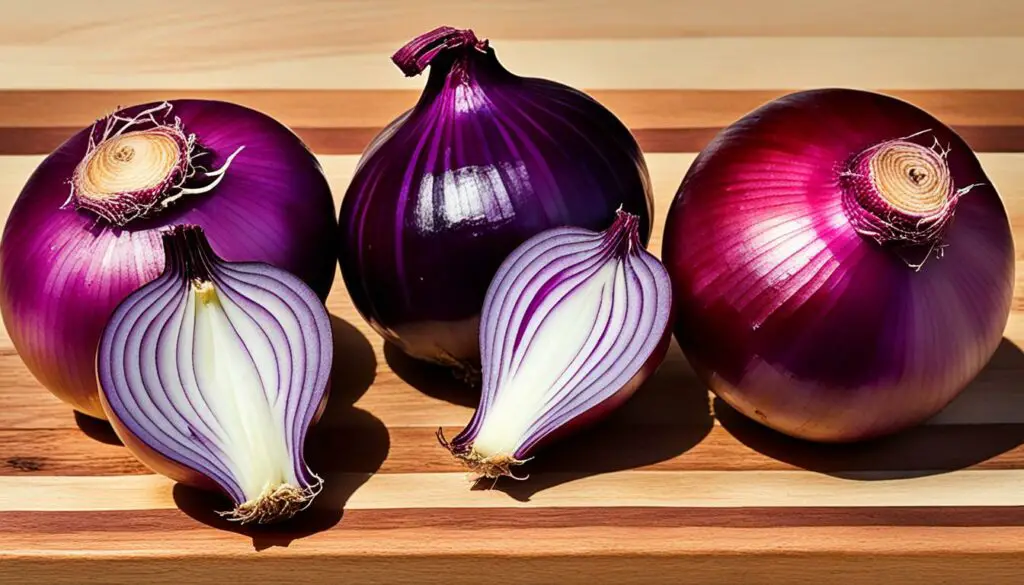
Onions are not only versatile but also incredibly versatile when it comes to pairing them with other ingredients. Whether you’re cooking with onions in a meaty dish, a vegetable stir-fry, a hearty grain-based recipe, or a flavorful legume curry, onions can take your culinary creations to the next level. However, if you find yourself without onions or need an alternative, there are onion substitutes available that can provide a similar flavor profile.
When substituting onions, shallots, leeks, or scallions can be used to achieve a comparable taste. Shallots are small, mild onions with a hint of garlic flavor. They work well in sauces, dressings, and delicate dishes. Leeks, on the other hand, have a sweet and mild flavor that complements soups, stews, and roasted dishes. Scallions, also known as green onions or spring onions, provide a fresh and slightly peppery taste, making them perfect for garnishing salads, stir-fries, and Asian-inspired dishes.
To explore the art of onion pairing, consider the following combinations:
| Ingredients | Recommended Pairings |
|---|---|
| Grilled Steak | Caramelized onions |
| Roasted Vegetables | Red onions |
| Lentil Soup | Leeks |
| Mexican Salsa | Scallions |
| Pasta Carbonara | Shallots |
Experimenting with different onion pairings can elevate your cooking by introducing new flavors, textures, and aromas. Get creative and try combining onions with your favorite ingredients to create unique and delicious dishes.
Remember, cooking with onions not only adds depth and flavor to your recipes but also provides potential health benefits. So, whether you prefer the classic caramelized onions or want to try out an alternative onion substitute, enjoy the art of onion pairing and savor the delightful culinary experiences it brings.
Conclusion
Onions are a culinary essential that can transform any recipe. Not only do they add flavor and depth to your meals, but they also offer numerous health benefits. Incorporating onions into your cooking can elevate the taste and nutritional value of your dishes.
Whether you’re sautéing onions to create a savory base, caramelizing them to add sweetness, or using them raw for a crunchy texture, onions enhance the overall enjoyment of your meals. They are a versatile ingredient that can be used in various cuisines and dishes, from soups and stews to salads and sauces.
In addition to their delicious flavor, onions provide numerous health benefits. They are packed with antioxidants and contain compounds that have been linked to reduced risks of certain cancers and heart disease. Onions also have antimicrobial properties and may help support a healthy immune system.
When cooking with onions, it’s important to keep a few tips in mind. Soak sliced onions in cold water before using to reduce their strong flavor. Cook them slowly over low heat for sweeter caramelized onions. Properly chopping onions ensures even cooking and distribution of flavor in your recipes.
So, the next time you’re in the kitchen, don’t forget to include onions in your recipes. Not only will they enhance the taste and aroma of your dishes, but they will also provide you with the numerous benefits that this humble vegetable has to offer. Happy cooking!
FAQ
Why are onions included in almost every recipe?
Onions are a versatile ingredient that adds flavor and depth to dishes. They are commonly used in various cuisines around the world and have many health benefits.
What other members of the Allium family can be substituted for onions in recipes?
Garlic, chives, shallots, and leeks can be substituted for onions, but replicating the unique flavor of onions can be difficult.
Which onion varieties are commonly used in different recipes?
Yellow onions are the most commonly used for cooking, white onions are commonly used in Mexican cuisine, red onions are used in salads and raw dishes, and shallots are perfect for sauces and dressings.
What are some popular dishes that include onions?
Onions are often used as a base for flavor in soups, stews, and sauces. They are also found in Indian curries, French onion soup, Italian pasta sauces, Mexican salsas, and many other dishes.
What health benefits do onions offer when included in cooking?
Onions are a good source of antioxidants and have compounds linked to a reduced risk of certain cancers, heart disease, and inflammation. They also have antimicrobial properties and may help boost the immune system.
How can I maximize the nutritional benefits of onions when cooking?
To maximize the nutritional benefits of onions, it is recommended to consume them raw or lightly cooked.
What are some cooking tips for using onions?
To reduce the strong flavor and pungency of onions, soak sliced onions in cold water for 10-15 minutes before using. For sweeter caramelized onions, cook them slowly over low heat until they turn golden brown. When sautéing onions, cook them until they are translucent for a milder flavor.
How do onions enhance different cuisines?
Onions play a vital role in various cuisines around the world, providing depth, flavor, and balance to dishes in Indian, French, Italian, Mexican, and many other cuisines.
What can be used as an onion substitute in cooking?
If you don’t have onions, shallots, leeks, or scallions can be used as substitutes to achieve a similar flavor profile.
Why should I include onions in my recipes?
Onions add flavor, depth, and nutrition to every recipe. Their versatility and unique taste make them a staple in kitchens worldwide.

